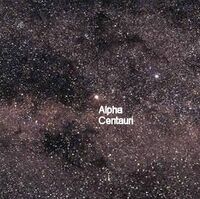Alpha Centauri
Relevance
Mentioned In
Wikipedia Information
 |
Alpha Centauri (α Centauri, α Cen, or Alpha Cen) is a triple star system in the southern constellation of Centaurus. It consists of three stars: Rigil Kentaurus (α Centauri A), Toliman (α Centauri B), and Proxima Centauri (α Centauri C). Proxima Centauri is the closest star to the Sun at 4.2465 light-years (1.3020 pc). α Centauri A and B are Sun-like stars (class G and K, respectively) that together form the binary star system α Centauri AB. To the naked eye, these two main components appear to be a single star with an apparent magnitude of −0.27. It is the brightest star in the constellation and the third-brightest in the night sky, outshone by only Sirius and Canopus. α Centauri A (Rigil Kentaurus) has 1.1 times the mass and 1.5 times the luminosity of the Sun, while α Centauri B (Toliman) is smaller and cooler, at 0.9 solar masses and less than 0.5 solar luminosities. The pair orbit around a common centre with an orbital period of 79 years. Their elliptical orbit is eccentric, so that the distance between A and B varies from 35.6 astronomical units (AU), or about the distance between Pluto and the Sun, to 11.2 AU, or about the distance between Saturn and the Sun. α Centauri C, or more commonly, Proxima Centauri, is a small faint red dwarf (class M). Though not visible to the naked eye, Proxima Centauri is the closest star to the Sun at a distance of 4.24 ly (1.30 pc), slightly closer than α Centauri AB. Currently, the distance between Proxima Centauri and α Centauri AB is about 13,000 AU (0.21 ly), equivalent to about 430 times the radius of Neptune's orbit. α Centauri C, or Proxima Centauri, has two confirmed planets: Proxima b or α Centauri Cb, an Earth-sized planet in the habitable zone discovered in 2016, and Proxima d (α Centauri Cd), a candidate sub-Earth which orbits very closely to the star, announced in 2022. The existence of Proxima c (α Centauri Cc), a mini-Neptune 1.5 AU away discovered in 2019, is controversial. α Centauri A may have a Neptune-sized planet in the habitable zone, though it is not yet known with certainty to be planetary in nature and could be an artifact of the discovery mechanism. α Centauri B has no known planets: Planet α Cen Bb, purportedly discovered in 2012, was later disproven, and no other planet has yet been confirmed.
